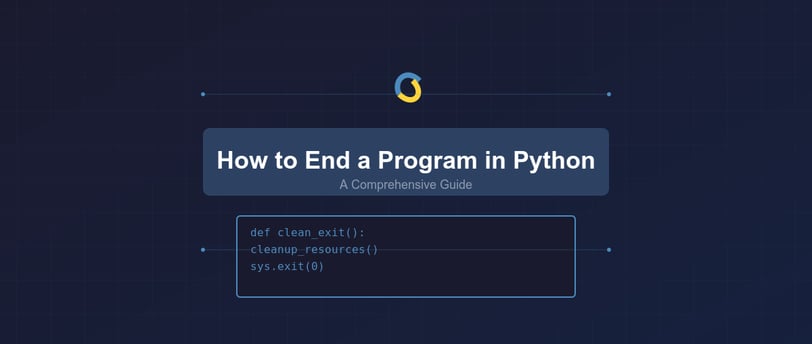How to End a Program in Python: A Comprehensive Guide
"Master Python program termination with this comprehensive guide covering everything from basic exits to enterprise-level strategies. Perfect for students and developers seeking professional-grade knowledge about clean program shutdown, resource management, and optimization techniques in Python"
Wilson Lara
5/8/20244 min read


How to End a Program in Python: A Comprehensive Guide
When it comes to programming assignment help, understanding how to properly terminate Python programs is crucial for developing robust applications. This comprehensive guide will walk you through everything you need to know about program termination in Python, making it an invaluable resource whether you're seeking take my online class for me services or working on your own projects.
Program Termination Architecture in Python
For students seeking programming assignment help, it's essential to understand that Python's program termination is more complex than simply stopping execution. Modern applications require sophisticated termination handling to ensure data integrity and system stability. When you take my online class for me services, you'll learn that proper termination handling can prevent data corruption and resource leaks.
The foundation of proper program termination lies in understanding Python's program lifecycle. When seeking programming assignment help, students often overlook the importance of memory management during program termination. Python's garbage collector automatically handles memory deallocation, but proper termination ensures all resources are released efficiently.
Process and thread termination models differ significantly in Python. While processes have independent memory spaces, threads share resources within a process. For those utilizing take my online class for me services, understanding this distinction is crucial for developing scalable applications.
Python provides several built-in functions for program termination:
python
exit() # Simple program termination
sys.exit(status) # Termination with status code
quit() # Interactive interpreter exit
Signal handling becomes particularly important when working with OS-level termination. Students seeking programming assignment help should understand how to implement signal handlers:
python
import signal
def handler(signum, frame):
print("Handling termination signal")
sys.exit(0)
signal.signal(signal.SIGTERM, handler)
When developing complex applications, students often seek programming assignment help to understand signal handling across different operating systems. Windows and Unix-based systems handle signals differently, which can affect how your program terminates. For those using take my online class for me services, it's crucial to learn platform-specific termination handling:
```python
import platform
def setup_termination_handlers():
if platform.system() == 'Windows':
# Windows-specific signal handling
signal.signal(signal.SIGBREAK, handler)
else:
# Unix-specific signal handling
signal.signal(signal.SIGHUP, handler)
signal.signal(signal.SIGTERM, handler)
Advanced Resource Management & Cleanup
When you take my online class for me, you'll learn that context managers are essential for resource cleanup. The 'with' statement ensures proper resource release:
python
with open('file.txt', 'r') as file:
content = file.read()
# File automatically closes after block execution
Custom destructors and exit methods provide fine-grained control over resource cleanup. Professional programming assignment help often emphasizes implementing these methods correctly:
python
class DatabaseConnection:
def exit(self, exc_type, exc_val, exc_tb):
self.connection.close()
System resource cleanup requires careful attention to files, database connections, and network sockets. Students seeking take my online class for me services should understand proper cleanup sequences:
python
def cleanup_resources():
close_database_connections()
clear_cache()
close_network_sockets()
When you take my online class for me, you'll learn about advanced resource tracking mechanisms. Professional programming assignment help often covers implementing resource tracking systems:
```python
class ResourceTracker:
def init(self):
self.resources = set()
def register(self, resource):
self.resources.add(resource)
def cleanup(self):
for resource in self.resources:
try:
resource.close()
except Exception as e:
logging.error(f"Failed to close resource: {e}")
self.resources.clear()
Exception Handling & Exit Code Protocols
POSIX exit codes provide standardized ways to indicate program termination status. When providing programming assignment help, we emphasize using appropriate exit codes:
python
sys.exit(0) # Successful termination
sys.exit(1) # Error termination
Exception handling during termination requires careful consideration. Students utilizing take my online class for me services learn to implement comprehensive error handling:
python
try:
perform_operations()
except Exception as e:
logging.error(f"Error during execution: {e}")
sys.exit(1)
finally:
cleanup_resources()
For students seeking programming assignment help, understanding logging during termination is crucial. When you take my online class for me, you'll learn about implementing comprehensive logging strategies:
```python
import logging.handlers
def setup_termination_logging():
handler = logging.handlers.RotatingFileHandler(
'termination.log',
maxBytes=1024*1024,
backupCount=5
)
logger = logging.getLogger('TerminationLogger')
logger.addHandler(handler)
return logger
def log_termination_sequence():
logger = setup_termination_logging()
logger.info("Starting termination sequence")
try:
cleanup_resources()
logger.info("Cleanup completed successfully")
except Exception as e:
logger.error(f"Cleanup failed: {e}")
Enterprise-Level Termination Strategies
For those seeking professional programming assignment help, understanding enterprise-level termination is crucial. Microservice architectures require coordinated shutdown protocols:
python
async def shutdown_services():
await stop_api_server()
await close_database_pools()
await terminate_background_tasks()
Multi-threaded application termination requires careful synchronization. When you take my online class for me, you'll learn proper thread termination patterns:
python
def terminate_threads():
for thread in active_threads:
thread.join(timeout=5)
if thread.is_alive():
thread.terminate()
Performance Optimization & Best Practices
Exit sequence profiling helps identify bottlenecks in termination procedures. Professional programming assignment help includes optimization techniques:
python
import cProfile
cProfile.run('cleanup_and_exit()')
Resource release optimization ensures efficient program termination. Students receiving take my online class for me assistance learn to implement efficient cleanup:
python
def optimized_cleanup():
with concurrent.futures.ThreadPoolExecutor() as executor:
futures = [executor.submit(cleanup_task) for cleanup_task in cleanup_tasks]
concurrent.futures.wait(futures, timeout=10)
When seeking programming assignment help, students often need guidance on implementing health checks during termination. Professional take my online class for me services cover creating robust health check systems:
```python
class TerminationHealthCheck:
def init(self):
self.checks = {}
def register_check(self, name, check_func):
self.checks[name] = check_func
def run_checks(self):
results = {}
for name, check in self.checks.items():
try:
results[name] = check()
except Exception as e:
results[name] = f"Failed: {e}"
return results
# Example usage
health_check = TerminationHealthCheck()
health_check.register_check("database", check_database_connections)
health_check.register_check("cache", check_cache_state)
results = health_check.run_checks()
Conclusion
Understanding proper program termination is essential for developing reliable Python applications. Whether you're seeking programming assignment help or take my online class for me services, mastering these concepts will significantly improve your programming skills. Remember to always implement proper resource cleanup and follow industry best practices for program termination.
Remember, while this guide provides comprehensive information, consulting with programming experts and utilizing professional services can further enhance your understanding of Python program termination strategies.
